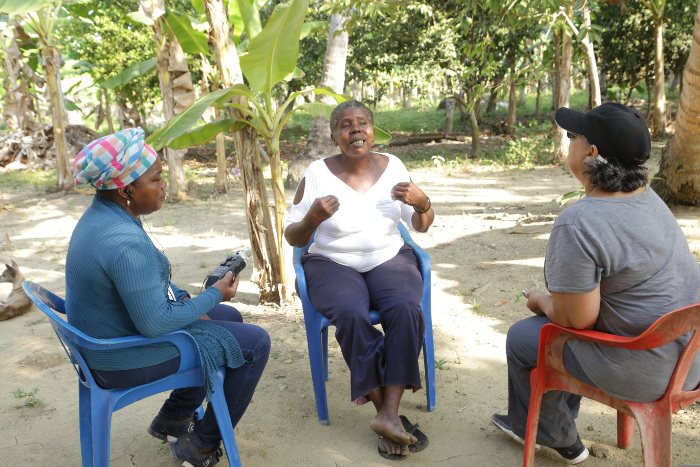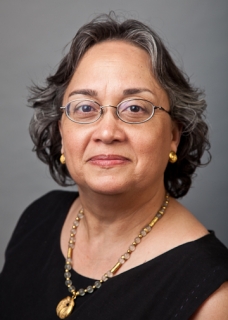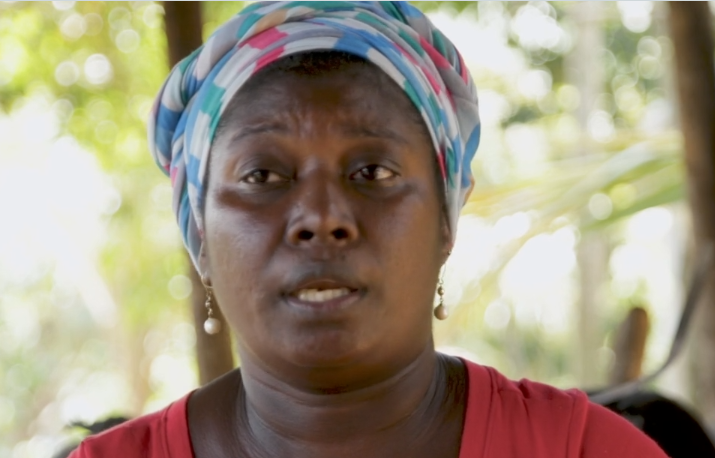Fulbright Research Highlights Plight of Colombia’s Montes de Maria Women
Originally published in the College of Liberal Arts & Sciences Newsletter
By Despina Williams Parker
With the support of a Fulbright Core Research Award, Ligia Aldana, an associate professor of Spanish and Latin American and Caribbean literature and culture in the Languages, Literatures & Cultures Department and the Latin American and Caribbean Studies Program, embarked on a deeply personal journey to her native Colombia last spring.
She interviewed women who endured violence and, for many, displacement from their generational homeland in the Northern coast’s Montes de Maria region, seeking to amplify their efforts to rise above their victimhood and reinvent themselves as community leaders, activists and organizers in an uncertain post-civil war era.
Aldana’s four and a half months in Colombia proved especially fruitful in generating new scholarly projects, including an article, a documentary and an interdisciplinary anthology that draw from the rich oral narratives, or testimonios, of women who share Aldana’s heritage and whose lived experiences of violence mirror her own.
“A fragility to everyday life”
Aldana’s childhood in El Carmen de Bolivar, a Montes de Maria municipality, was marked by the violence of Colombia’s civil war. On outings with her grandfather, she walked on the opposite side of the gun stashed in his pocket and sealed herself inside the family home every afternoon at 5 p.m.
Though the Montes de Maria suffered 56 documented massacres during Colombia’s five decades-long civil war, claiming 30 percent of the conflict’s over eight million victims, the region has been mostly neglected in scholarship about the war.
“I don’t recall a time when violence was not part of my growing up in Colombia,” Aldana recalled. “There was such a fragility to everyday life.”
The Montes de Maria region suffered 56 documented massacres during Colombia’s five decades-long civil war, claiming 30 percent of the conflict’s over eight million victims.
Aldana left Colombia in 1972, and after a short stay in France, she returned to the United States to study comparative literature at Smith College before earning a Ph.D. in Romance Studies and Spanish at the University of Miami. Her research agenda has focused on music and cultural identity in the Spanish-speaking Caribbean, culture and resistance, and Afrolatin@merican and Caribbean literature and culture.
Aldana returned to Colombia in 2004 to study champeta, a Congolese soukous-inspired musical genre that celebrates the Colombian Caribbean’s Afro identity. Aldana’s connections within the community of artists and activists within the primarily male, urban champeta scene helped her gain entry into discussions and debates around the armed conflict, and sparked a desire to examine the conflict’s impact on the Afrodescendant and Afroindigenous women of the Montes de Maria region.
The Testimonial Tradition
As a recognized Latin American literary genre, testimonio has brought awareness to violent conflicts, though a scarcity of oral narratives by women of African descent exists.
Colombia has the third largest population of descendants of enslaved Africans in the Americas, and the Montes de Maria, with its historic ties to the transatlantic slave trade and Maroon societies, has a significant Afrodescendant and indigenous population.
With the support of her longtime research collaborator and filmmaker David Lara (Universidad de Cartagena), Aldana recorded testimonios of 13 Afrodescendant and Afroindigenous women who represent a diverse sample of Montes de Maria women: they hail from different locales and responded to increased violence in the region in various ways. Some remained despite paramilitary occupation, while others were displaced, and still others were displaced but returned.
The testimonio genre has brought awareness to violent conflicts, though a scarcity of oral narratives by women of African descent exists.
In her work, Aldana highlights the ethnic and Diasporic dimensions of the women’s experiences of the Colombian conflict as articulated in their testimonios.
She also defines their self-reinvention as community leaders as a “pull towards inhabiting spaces and mindsets as a necessary act, once they find that their previous selves are no longer effective within a reality plagued by the trauma of war and the need to claim justice, restitution and reparation.”
“We demand to be given what belongs to us”
The 2016 peace accord reached by the Colombian government and the Revolutionary Armed Forces of Colombia (FARC) established a transitional justice system and Special Jurisdiction for Peace (JEP) tribunal to try former rebels and military officers for war crimes. A previous truce with members of paramilitary forces was signed in 2005, which pardoned most of their leaders.
The women Aldana interviewed previously gave accounts of the violence they suffered, at times testifying before their attackers, who confessed to their crimes in order to avoid lengthy jail sentences. This process enabled the women to receive official recognition as victims of war and made them eligible to receive reparations and the restoration of seized lands, though for many, meaningful assistance has not been forthcoming.
In her testimonio, Argelia Silgado Padilla recalled her birthplace in Santa Fe de Hicotea, the place where she’d taken her first steps, explored the land and grown crops to support her family.
Stripped of her land by paramilitary forces in 2000, she relocated to San José de Playón, where she remained. She identified as a victim of the armed conflict and also a victim of sexual violence at the hands of the local police. To support her five children, she sold fried food, and used the one-time money paid for her displacement to purchase the land where her mud hut stands.
When additional government help did not materialize, Padilla began educating herself, taking advantage of self-help workshops, psychological counseling and trainings on land and peace processes provided through non-profits. She organized a women’s group now composed of 27 families, called the Association of Afro Victims of the Armed Conflict and Sexual Violence (ASOMUSOCO).
Though she acknowledges the role of struggle in making her who she is today, she has maintained her agency—“one gives oneself strength to go forward”—and powerfully advocates for herself and her community.
“I decided to start ASOMUSOCO to show the state and society that we as people have rights,” she said. “We want to claim our rights as human beings, also as an Afro woman. We demand to be given what belongs to us as women. We have hope that we can recover what we lost.”
Padilla’s powerful demand for her rights as a person and woman of African descent echoes throughout the 13 testimonios.
“I think they’re relying more on their own ability to make change happen, to place demands on the government and to organize themselves to lift their communities again. It has really empowered them in ways that they never expected,” said Aldana.
The desire to secure a better future for their children and preserve their land and time-honored agricultural practices are other important themes.

Aldana interviewed Elba, an Afroindigenous Zenu woman and wife of murdered ANUC (National Peasant Association of Colombia) leader, who along with other displaced victims, have sued the government for the erasure of agrarian loans they were forced to secure under questionable terms.
She continues to process unspeakable traumas suffered during the conflict by working the parcel of land she retained after being displaced from her murdered uncle’s farm.
The land of the Montes de Maria carries a rich personal heritage, passed down from generation to generation, providing sustenance and self-sufficiency to those who tend it. Cultivating the land has traditionally represented a projecto de vida, or life project, for the women of the Montes de Maria.
“I think they’re relying more on their own ability to make change happen, to place demands on the government and to organize themselves to lift their communities again. It has really empowered them in ways that they never expected.”
In sharing their thoughts on the peace process and the potential for long-term peace in the region, the women stressed the need for education, healthcare and community input while also emphasizing their strong ties to the land.
“We all need to agree on what we want for the future,” said Padilla. “To have lasting and sustainable peace, first of all, we have to rebuild what has been lost. We do not have land to work. And if you do not have land to work, there will always be hunger, and there will be violence.”
Finding Stories
Aldana’s research coincided with renewed violence across the region during the lead up to the presidential election of right-wing candidate Ivan Duque, who has been critical of the peace process. Aldana benefited from the support of her collaborator, Lara, and host, the Universidad de Cartagena’s Instituto Internacional de Estudios del Caribe.
Though travel across the region posed real danger, Aldana found herself uniquely positioned for the work, due to her status as a bilingual native with dual citizenship and connections built over a decade of research in the region.
Aldana recognizes her impulse to give back to her birthplace through her research, while also acknowledging the “megaphone” given to her as a Fulbright scholar. “The validation behind the work that you do, people listen. It opens doors. There is respect for the work that you are doing, and for that, I do have to be grateful.”
In the year after her research leave, Aldana has continued to work on her article, “Re-structuring the Self through Culture and Memory: Narratives by Afro Women from Montes de Maria, Colombia.” She will present her paper, “Acts of (Black) Resistance: Afrodescendant and Afroindigenous Women’s Activism Post-Conflict in Montes de María,” at the Latin American Studies Association conference in Boston in May.
Aldana is finishing up a short documentary called Resistentes! Afrodescendant Women in War and Peace in Montes de Maria Colombia, which offers clips of her interviews with the Montes de Maria women. Digital Media and Journalism students Kevin Flores and Camille Murphy have assisted with editing the film.
Aldana also has submitted a proposal for an interdisciplinary anthology that aims to introduce the women’s testimonios to an English-speaking audience, as well as to offer historical, political, social and environmental perspectives on the conflict’s impact on the critically-neglected Montes de Maria region.
Returning to Colombia’s Northern coast gave Aldana new insight into the multi-faceted aspects of her identity mirrored in the courageous Montes de Maria women. “I never, because I was born there, never realized what it meant to be a Montemariana, because it’s always like that, you never know until you leave. The things I learned and the things that make me have all to do with that space…. It’s identity at all levels—racial, regional, national, as a woman, the violence that is in the space, the history behind it—all of these pieces were always there,” she said.
Aldana’s contributions to scholarship on gender, race, blackness, community, national belonging and cultural practices amount to a projecto de vida powerfully shaped by her experiences as an Afrodescendant Colombian woman.
In sharing the testimonios of the Montes de Maria women, Aldana hoped to acknowledge both their unimaginable pain and singular courage, not by giving them a voice, but by allowing their voices to be heard. Together, they achieved what might be best described as harmony.
“I don’t want to say that they were grateful, but we found ourselves as equals in the sense that we’re both finding stories,” said Aldana. “They’re building theirs and I’m finding mine.”




